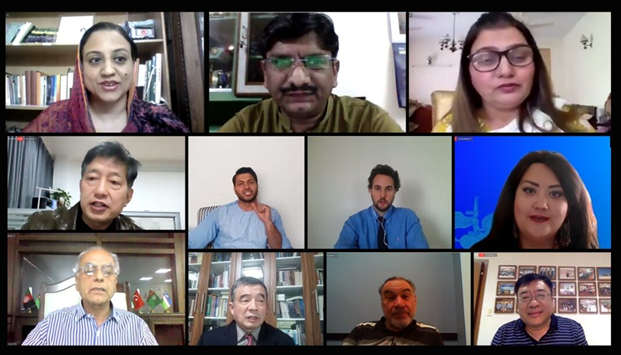Building Academic Linkages within BRI Countries- Webinar contributed to by ECOSF President as BRISECC Vice President
Go Back

A “Webinar on Building Academic Linkages within BRI Countries” was organized by the Institute of Peace and Diplomatic Studies (IPDS) on 7th May 2021. The objective of the webinar was to discuss the academic avenues and potential within the BRI countries.
It was moderated by Ms. Farhat Asif, Founder President of IPDS and attended by the experts, researchers, academia and students from all over the world. President ECOSF Prof. Manzoor Soomro joined as an invited speaker.

The renowned speakers from different countries such as China, France, Pakistan, Iran, Kazakhstan, Afghanistan spoke during the webinar.
Prof. Manzoor Soomro, President ECOSF, who is also Vice President of Belt and Road Science Education Coordination Committee (BRISECC) in his speech introduced his organization i.e., ECO Science Foundation (ECOSF) and its aims, objectives and activities and said that Science, Technology and Innovation (STI) play a critical role in providing policy instruments that are essential to develop strong base of countries for boosting socio-economic growth and sustainable development.
He also introduced the BRISECC and its aims and objectives. The Belt and Road Initiative of China commits to foster the industrial development with strong technical cooperation in many fields, including Sustainable Energy, Infrastructure Development, Emerging Technologies, Smart Cities and Transport etc. To achieve these massive goals, it requires a robust commitment to support science and engineering, including the capacity building of human resource. He further added that undoubtedly the BRI is an ambitious effort to improve regional cooperation; and connectivity is the core determinant to this entire initiative. Thus, the Economic Cooperation Organization (ECO) region; which includes Afghanistan, Azerbaijan, Iran, Kazakhstan, Kyrgyzstan, Pakistan, Tajikistan, Turkey, Turkmenistan and Uzbekistan, being important part of BRI, holds great potential and significance as an important gateway to connect China with the Middle East, South West Asia and Europe and beyond. He also said that to maximize the benefits of BRI, the participating countries need to establish and engage in an alliance for promotion of cross-border cooperation in the academic and STI sectors. President ECOSF also shared that ECOSF has developed strong and strategic collaboration with Chinese academic and STI institutions and under the collaboration numerous activities such as capacity building workshops, seminars, science camps for the students and teachers have been organized/arranged. He further said that these experiences can be replicated in other B&R countries for cooperation.
Security and Diplomacy Professor Dr Wang Li at the School of International and Public Affairs, Jilin University, China, said that through stronger cooperation between China, Russia, Pakistan and Iran, peace and stability in the region can be restored and built-in region and beyond. He added that this would also promote cooperation with the BRI.
EU-China Program Centre International de Formation Européenne (CIFE) France Director Dr George N. Tzogopoulos said that China and the EU can cooperate to promote strong linkages in all spheres.
Professor Dr Hong Mi of the School of Public Affairs at Zhejiang University, China, highlighted that given the Covid-19 pandemic, stronger partnerships were required amongst scientists and academics to curb the virus through sharing of knowledge and better understand the dangers posed by the deadly infection.
Vice Rector for International Cooperation at the Eurasian National University, Kazakhstan, Prof. Dr Zholdasbekova Akbota Niyazovna stated that BRI was warmly received in Kazakhstan and there is a strong partnership between Kazakhstan and China on issues of mutual trust, especially academic and scientific linkages.
Shaheed Benazir Bhutto Women University Peshawar-Pakistan Vice Chancellor Prof. Dr Razia Sultana said that there is a need for greater collaboration amongst universities of BRI countries. She said this could best be done through innovation and scholarships for the exchange of students and faculties.
Head of the Centre for China Studies Allameh Tabataba’i University, Iran, Prof. Dr Gholamali Chegnizadeh indicated to create a network of universities and HEI on BRI countries to contribute innovatively towards BRI.
A visiting professor at the China Renmin University, China, Professor Zhou Rong said there is a need to produce more literature to share scientific knowledge among academics on BRI countries.
Kardan University, Afghanistan Head of Economics Department Mr. Qais Mohammadi said Afghanistan has huge potential to contribute meaningfully towards the overall objectives of BRI.